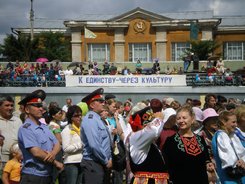Siberian Studies Centre
Research Period: 2002-2012

Directors: Chris Hann, Günther Schlee
Coordinator: Joachim Otto Habeck
Halle prides itself on its long-standing engagement in research on Siberia, which began in the mid-18th century. Owing to changing circumstances in science and international politics, this line of inquiry has experienced several ups and downs. The Siberian Studies Centre of the MPI seeks to pick up the threads of this research history and to weave them into contemporary anthropology. Simultaneously, it addresses present-day social processes and technical changes in Siberia, pursuing them in terms that make sense to those who live them – the inhabitants of Siberian cities, villages, and nomadic camps.
Icy confines, deportation, and forced labour camps all figure prominently in the public perception of Siberia, as do endless forests, unspoilt nature, and indigenous peoples with their traditional culture. Travel agencies and some municipalities consciously produce and reproduce such exotic imagery, as it fuels the developing tourism industry. The expression and management of ethnicity and culture, and the creation and circulation of symbols and commodities, deserve the attention of social scientists working in Siberia.
Much of Siberia is part of the Far North. As such it shares many cultural and political traits with other parts of the Arctic and Subarctic. These traits lend themselves to a specific way of doing research, with its own paradigms and perceptions, fascinations and blind spots. Certain research topics have been studied intensively, notably ethnicity, human-animal relations, shamanism, traditional forms of land use, the social-economic impact of hydrocarbon extraction and, most recently, climate change. Other topics have been largely ignored: for example, the political economy of the “periphery”, labour markets and migration, or the social conditions of shift work and long-distance commuting. Only very recently have anthropologists begun to study these themes and to conduct research among non-indigenous and urban inhabitants in Siberia.
Building upon and intensifying research on certain “classic themes”, the Siberian Studies Centre seeks to add novel sociological approaches. The hallmarks of the Siberian Studies Centre’s research programme include exploration at the micro-level through ethnographic fieldwork, a combination of individual investigations and comparative methods, the contextualisation of Siberian studies within general anthropology, and international scientific cooperation.
